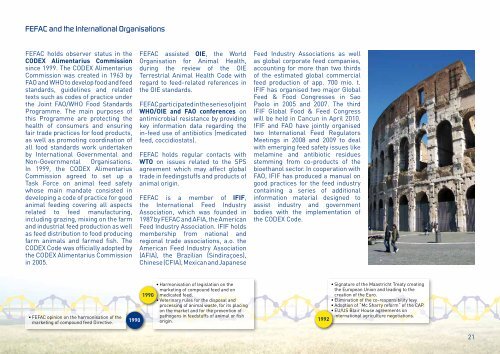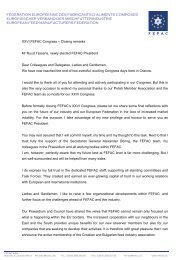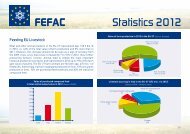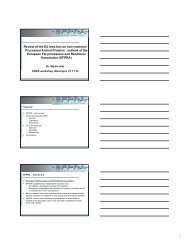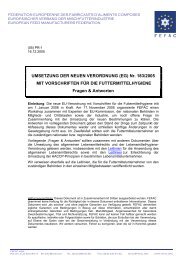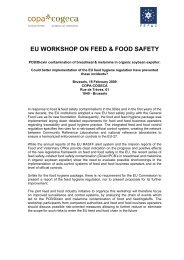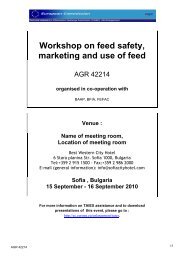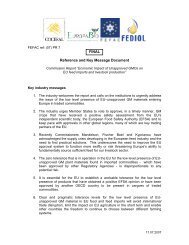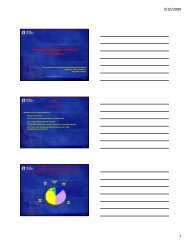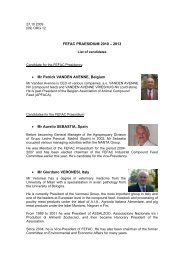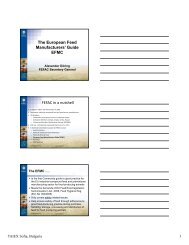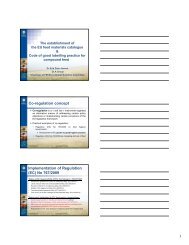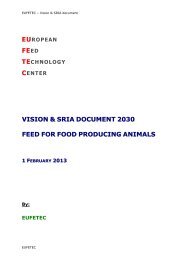Brochure (PDF) - Fefac
Brochure (PDF) - Fefac
Brochure (PDF) - Fefac
Create successful ePaper yourself
Turn your PDF publications into a flip-book with our unique Google optimized e-Paper software.
FEFAC and the International Organisations<br />
FEFAC holds observer status in the<br />
CODEX Alimentarius Commission<br />
since 1999. The CODEX Alimentarius<br />
Commission was created in 1963 by<br />
FAO and WHO to develop food and feed<br />
standards, guidelines and related<br />
texts such as codes of practice under<br />
the Joint FAO/WHO Food Standards<br />
Programme. The main purposes of<br />
this Programme are protecting the<br />
health of consumers and ensuring<br />
fair trade practices for food products,<br />
as well as promoting coordination of<br />
all food standards work undertaken<br />
by International Governmental and<br />
Non-Governmental Organisations.<br />
In 1999, the CODEX Alimentarius<br />
Commission agreed to set up a<br />
Task Force on animal feed safety<br />
whose main mandate consisted in<br />
developing a code of practice for good<br />
animal feeding covering all aspects<br />
related to feed manufacturing,<br />
including grazing, mixing on the farm<br />
and industrial feed production as well<br />
as feed distribution to food producing<br />
farm animals and farmed fish. The<br />
CODEX Code was officially adopted by<br />
the CODEX Alimentarius Commission<br />
in 2005.<br />
• FEFAC opinion on the harmonisation of the<br />
marketing of compound feed Directive.<br />
1990<br />
FEFAC assisted OIE, the World<br />
Organisation for Animal Health,<br />
during the review of the OIE<br />
Terrestrial Animal Health Code with<br />
regard to feed-related references in<br />
the OIE standards.<br />
FEFACparticipatedintheseriesofjoint<br />
WHO/OIE and FAO conferences on<br />
antimicrobial resistance by providing<br />
key information data regarding the<br />
in-feed use of antibiotics (medicated<br />
feed, coccidiostats).<br />
FEFAC holds regular contacts with<br />
WTO on issues related to the SPS<br />
agreement which may affect global<br />
trade in feedingstuffs and products of<br />
animal origin.<br />
FEFAC is a member of IFIF,<br />
the International Feed Industry<br />
Association, which was founded in<br />
1987 by FEFAC and AFIA, the American<br />
Feed Industry Association. IFIF holds<br />
membership from national and<br />
regional trade associations, a.o. the<br />
American Feed Industry Association<br />
(AFIA), the Brazilian (Sindiraçoes),<br />
Chinese (CFIA), Mexican and Japanese<br />
1990<br />
• Harmonisation of legislation on the<br />
marketing of compound feed and on<br />
medicated feed.<br />
• Veterinary rules for the disposal and<br />
processing of animal waste, for its placing<br />
on the market and for the prevention of<br />
pathogens in feedstuffs of animal or fish<br />
origin.<br />
Feed Industry Associations as well<br />
as global corporate feed companies,<br />
accounting for more than two thirds<br />
of the estimated global commercial<br />
feed production of app. 700 mio. t.<br />
IFIF has organised two major Global<br />
Feed & Food Congresses in Sao<br />
Paolo in 2005 and 2007. The third<br />
IFIF Global Food & Feed Congress<br />
will be held in Cancun in April 2010.<br />
IFIF and FAO have jointly organised<br />
two International Feed Regulators<br />
Meetings in 2008 and 2009 to deal<br />
with emerging feed safety issues like<br />
melamine and antibiotic residues<br />
stemming from co-products of the<br />
bioethanol sector. In cooperation with<br />
FAO, IFIF has produced a manual on<br />
good practices for the feed industry<br />
containing a series of additional<br />
information material designed to<br />
assist industry and government<br />
bodies with the implementation of<br />
the CODEX Code.<br />
• Signature of the Maastricht Treaty creating<br />
the European Union and leading to the<br />
creation of the Euro.<br />
• Elimination of the co-responsibility levy.<br />
• Adoption of “Mc Sharry reform” of the CAP.<br />
• EU/US Blair House agreements on<br />
international agriculture negotiations.<br />
1992<br />
21


